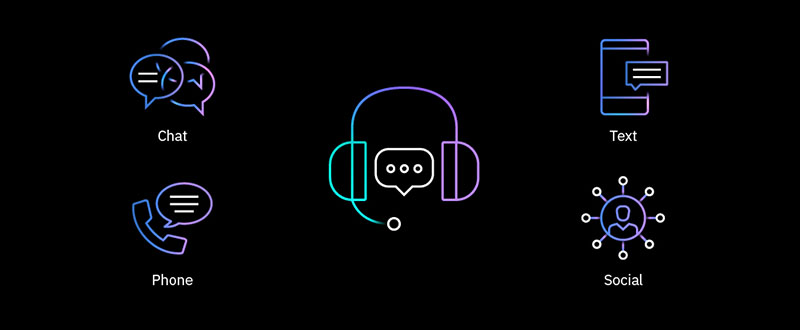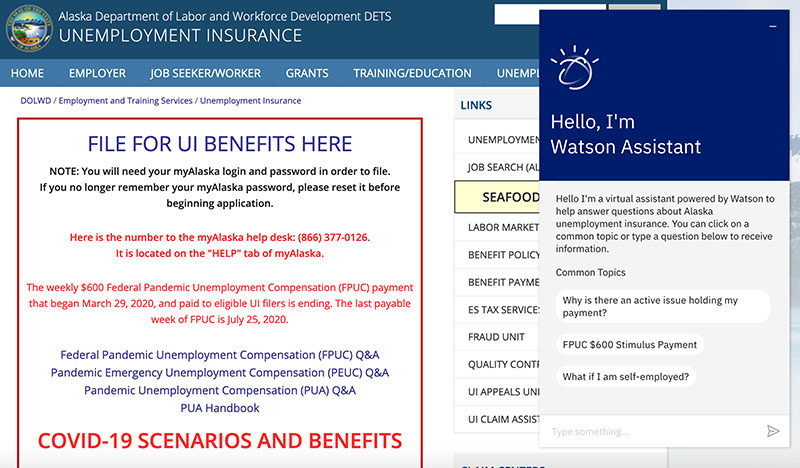IBM Watson
Virtual Agents Help Businesses Respond During the Pandemic and Thrive in the “New Normal”
By Elissa Gootman
As COVID-19 spread across the globe, organizations of all shapes and sizes were faced with a deluge of inquiries from customers, employees and the public at large.
Facing unprecedented challenges, many turned to Watson Assistant, IBM’s AI-powered virtual agent for business. IBM offered it to organizations at no charge for at least 90 days for COVID-19 use cases through the end of June. Watson Assistant has helped organizations manage spikes in customer and employee demands and answer questions related to the impact of the pandemic. Use of Watson Assistant increased 59 percent between February and May of this year, and organizations in 25 countries and across multiple industries have used it as part of their COVID response.

Moving forward, many of these organizations indicate they are looking at ways to use AI to take on the new challenges they are facing, such as return-to-workplace plans and engaging with customers and employees in the “new normal.” Having gotten a taste of how virtual agents can improve engagement and efficiency, many now have a bigger appetite. Faced with economic uncertainty and a fiercely competitive business environment, they are drawing on the technology to rethink their approach to customer and employee engagement.
Among the organizations that have used the technology to quickly address customers’ and constituents’ needs: WINDTRE and TIM Brasil, telecom providers in Italy and Brazil respectively; Royal Marsden, a world-leading cancer center in the UK; National Health Service Wales: Cwm Taf Morgannwg University Health Board; the Mexican Society of Pneumology and Thoracic Surgery; the government of Colombia; and Alaska’s Department of Labor and Workforce Development.
“We saw organizations facing 10-fold and even 100-fold increases in calls and information requests. Companies that may have been considering AI, or studying the value they could receive, were pushed to jump right in to it during the pandemic out of sheer necessity, and many of our existing clients had new challenges and needs arise,” said Toby Cappello, IBM’s vice president for Data and AI Expert Labs and Learning. “After seeing firsthand how quickly you can customize and get value from Watson Assistant to enhance the customer experience, we’re now seeing companies explore how they can use virtual assistants to transform other aspects of their operations and position themselves to thrive in the new normal.”
Natural Language Processing and the Rise of Virtual Assistants
According to research commissioned by IBM in partnership with Morning Consult, most global businesses surveyed have either deployed AI in their business (34%) or are ramping up exploratory phases with AI (39%), meaning almost 3 in 4 businesses surveyed are in the AI game.
Some believe that COVID-19 may have escalated the pace of AI adoption and integration. The pandemic posed a double challenge to many businesses, nonprofits and government agencies. Not only were they flooded with inquiries and rapidly changing information, but they were severely hampered in their ability to respond. Many employees are working from home, often with limited access to information and to IT systems.
AI-powered virtual assistants are not a new concept, but advances in the field of natural language processing (NLP) have made them more powerful and effective in understanding the nuances of language. They can also be more easily trained and customized to each organization’s unique needs and stakeholders. Most chatbots try to mimic human interactions, which can frustrate users if a misunderstanding occurs. Watson Assistant is designed to know when to search for an answer from a knowledge base, when to ask for clarity and when to direct users to a team member. With guidance and information on COVID-19 evolving frequently, Watson Discovery is designed to automatically crawl sources to help ensure a virtual assistant is equipped and trained with new information and resources.
Innovation in Telecommunications
WINDTRE, at the top of the mobile market in Italy and one of the main operators for fixed-line telecommunications in Italy, turned to IBM to launch a virtual assistant last year. Supported by IBM Watson, two chatbots handle millions of interactions with customers, improving their experiences and giving customer service agents more time to spend on pressing matters. When COVID-19 coursed through Italy, WINDTRE’s call center staff had to work from home at a time when user demands increased significantly. In particular, the adoption of an AI virtual agent with voice capacity allowed WINDTRE to further improve the management of call center peaks—helping customer care specialists in handling phone requests from clients during the lockdown and helping mitigate the impacts of office closures and remote-working in the months since.
Based on that success, IBM and WINDTRE announced in June that they had signed a multiyear extension of their agreement for the design, development and delivery of AI projects focusing on customer experience management.
TIM SA provides telecommunications services including mobile and fixed broadband to residential and corporate customers in Brazil. TIM's virtual assistant uses IBM Watson Assistant on IBM public cloud to respond by voice in natural language and in real time to consumers' questions or problems on issues such as the benefits of their plan, bill payments and unblocking lines, among others. Since the launch of the virtual agent, more than three million calls have been completed. During this period, call retention—when customer service is successfully performed on the platform, without the involvement of a human attendant—grew by 75%.

New Healthcare Use Cases
Hospitals and healthcare workers around the world found innovative new use cases for Watson Assistant to help convey health and safety information to patients, frontline workers and the public. As the pandemic continues to evolve, many are exploring further applications for the technology.
Cwm Taf Morgannwg University Health Board, part of The National Health Service Wales, launched CERi, its Welsh and English-speaking virtual agent, using IBM Watson Assistant. As Wales slowly eases out of lockdown, the agent will support patients, healthcare workers and the general public with information on the prevention and management of COVID-19. CERi provides rapid answers in a conversational tone to common questions on topics ranging from how to isolate safely and effectively, to safe food preparation, to protecting yourself and family members. CERi also offers practical advice on managing symptoms like fatigue, dealing with anxiety and uncertainty, and disinfecting your home.
“Using AI and natural language processing capabilities from IBM, CERi has been designed to evolve and learn through use and user feedback. In particular, we have tried to focus on the language and way her dialogue shows empathy, caring and understanding. Welsh people speak from their hearts and making sure CERi shows empathy and understanding is critical to us,” said Dr. Phil Webb, Head of Value Based Healthcare at Cwm Taf Morgannwg University Health Board.
The Royal Marsden, a leading cancer center with hospitals in London and Surrey, England, launched its “Ask Maisie” virtual agent to give employees rapid, consistent HR information relating to the virus and related workplace guidance. As the country emerges from lockdown and as government guidance evolves, Ask Maisie is providing employees with information about how to safely return to the workplace, how to self-isolate and what to do if your child’s school is closed. This enabled the hospital to manage its workforce efficiently while helping to alleviate some of the additional worries key workers may be experiencing at this challenging time.
“The coronavirus pandemic has meant we’ve had to make a lot of changes very quickly to our work across both the clinical and non-clinical areas of The Royal Marsden. As a result, there have been a huge number of HR changes and queries, and it’s been fantastic to work with IBM to create a virtual solution to help the team triage these requests so we can prioritize the critical issues,” said Ellen Mossman, Deputy Director of HR at Royal Marsden.
The Mexican Society of Pneumology and Thoracic Surgery created a virtual agent to provide citizens prompt responses to the most frequently asked COVID-19 questions 24/7 through its website. The new COVID-19 response agent offers citizens an easily accessible platform in a timely manner.
Public Sector Growth
Local and national governments have also tapped Watson Assistant to impart information to citizens around the world—including in Brazil, Canada, Colombia, Czech Republic, Germany, Greece, Korea, India, Spain, Philippines and Russia.
In South America, the government of Colombia customized Watson Assistant to create “Cory,” a virtual agent trained to answer 40 unique questions related to COVID-19. Since its launch, Cory has been trained to answer an additional 180 questions about topics including international travel guidance, prevention tactics and government policies. Cory facilitates over 11,000 interactions per month.
Like many other states, Alaska’s shutdown in response to the COVID-19 pandemic produced a flood of unemployment claims for the state’s Department of Labor and Workforce Development. The state was down 43,000 jobs in April 2020—a devastating toll in a state with a population of 731,000 people. To help handle the deluge of inquiries, the department pursued a rapid response. In addition to bringing on 100 additional support staff, Alaska quickly launched a Watson Assistant virtual agent on its unemployment insurance web page. In its first 50 days of operation, the virtual assistant held 24,216 conversations with 17,470 unique users.

Alaska's Watson Assistant virtual agent, in use on the Department of Labor website
The COVID-19 pandemic has turned traditional ways of working and operating upside down for organizations across many industries around the world. AI-powered virtual assistants can be a powerful resource for evolving and adapting to rapidly changing customer and employee demands, and their impact is poised to grow as the natural language processing capabilities behind them become even more adept at mastering the complex language of business.